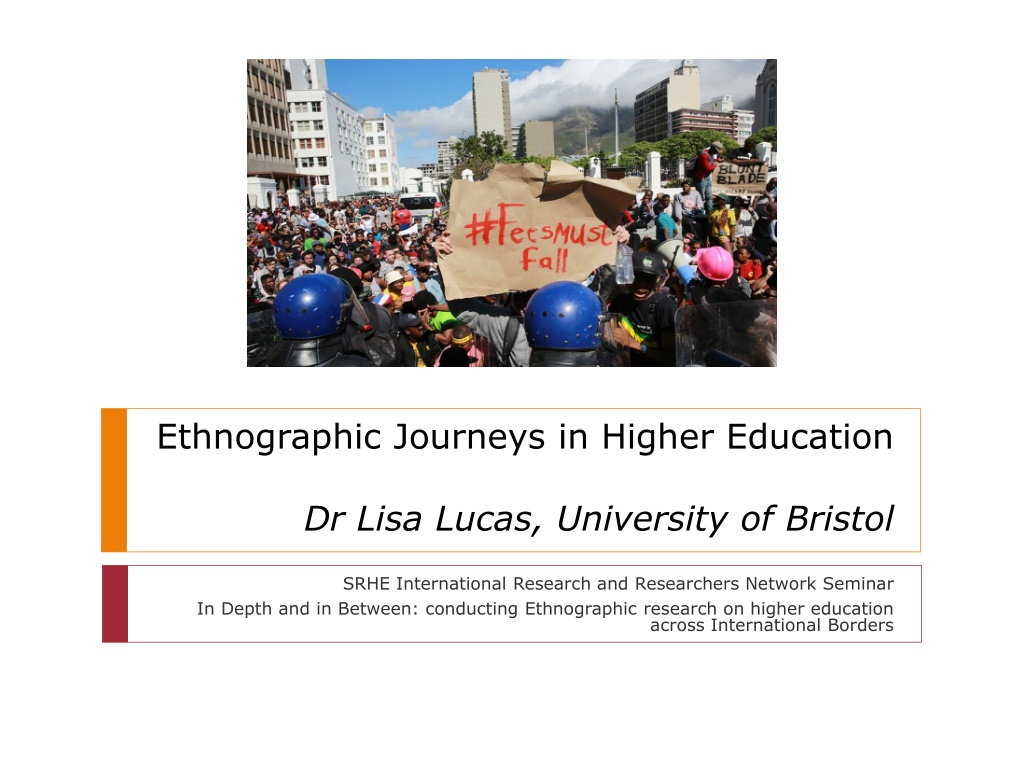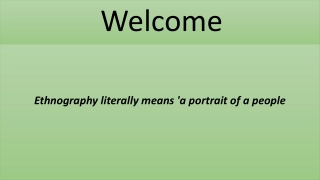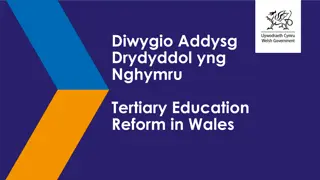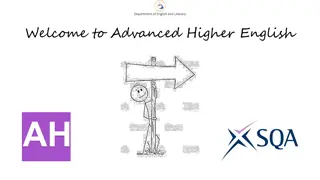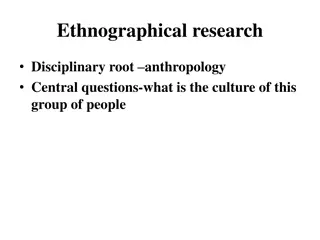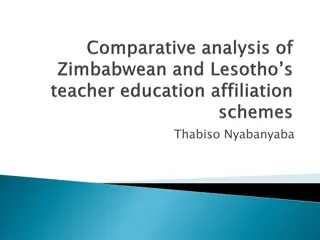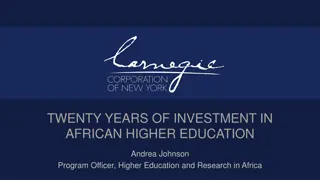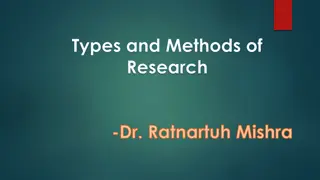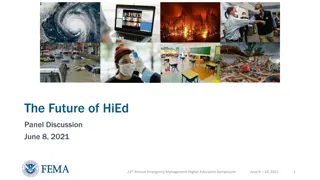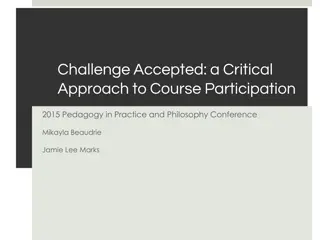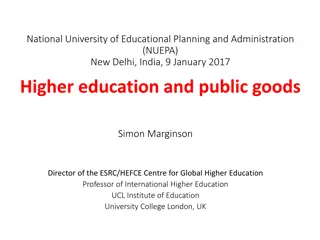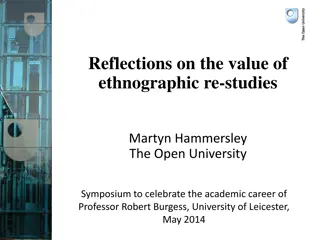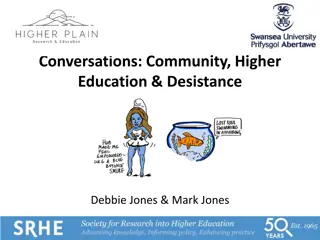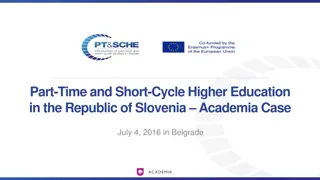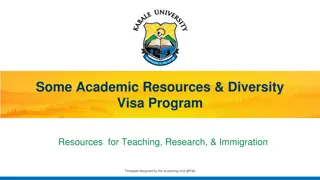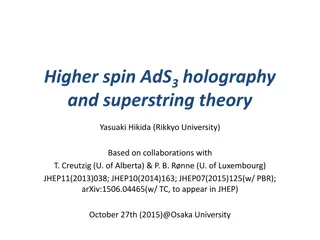Exploring Ethnographic Research in Higher Education
Dive into the world of ethnographic research in higher education, where researchers immerse themselves in the community to understand cultural nuances, symbols, and meanings. Discover the importance of insider knowledge and direct participation in shaping rich ethnographic data across international borders.
Download Presentation

Please find below an Image/Link to download the presentation.
The content on the website is provided AS IS for your information and personal use only. It may not be sold, licensed, or shared on other websites without obtaining consent from the author. Download presentation by click this link. If you encounter any issues during the download, it is possible that the publisher has removed the file from their server.
E N D
Presentation Transcript
Ethnographic Journeys in Higher Education Dr Lisa Lucas, University of Bristol SRHE International Research and Researchers Network Seminar In Depth and in Between: conducting Ethnographic research on higher education across International Borders
What is Ethnography? a longer period of field work in which the researcher tries to get close to the community (organization, group) being studied, relies on their accounts as well as on observations of a rich variety of naturally occurring events (as well as on other materials, e.g. documents or material artifacts) and has an interest in cultural issues (meanings, symbols, ideas, assumptions) (Alvesson, 2003: 171).
Why Ethnographic Research on Higher Education? Insider knowledge means that the description of studies as being simply based on interview data is too thin because richly ethnographic data are entailed in interpretation, even if only tacitly. We suggest that, in failing to make a break with our common-sense knowing, this tacit ethnographic is problematic as it is hidden from systematic scrutiny . It has become increasingly apparent that the term ethnography is appropriated by and for research that is nothing of the kind. So while I do not want to fetishise such things, I do insist on ethnographic fieldwork that involves some degree of direct participation and observation, and that constitutes a radically distinctive way of understanding social activity in situ, (p.3) Clegg & Stevenson (2013) Atkinson (2015)
Ethnographic work in Higher Education Mapping Areas of Research It is imperative that we turn our critical lens on the very institutions where many of us work and see that the forces of globalism are not only operating on the institutions we inhabit, they are transforming the way we produce knowledge and infiltrating our very consciousness. It is critical that we understand these processes (Shumar, 2004) Ethnography of Student Life, Student Cultures and Student Learning Ethnographic Explorations of University and Disciplinary Organisation and Cultures Ethnography and Higher Education Governance and Policy
Types of Ethnographies (Lucas, 2012) Traditional Ethnographies (Nathan, 2005) Multi-sited Ethnographies (Wright, forthcoming) Virtual ethnography (Hemmi et al, 2009) Auto-ethnography (Alvesson, 2003) Fictional Ethnography (Tierney, 1993) Duo-Ethnography (Sawyer & Norris, 2012)
Student Life, Student Cultures and Student Learning the students have no idea what the professors spend their time doing two sophomore friends once admitted to me that they had always privately thought that tenure meant that a faculty member had been around for ten years (Moffatt, 1989: 25) Moffat (1989) Coming of Age in New Jersey Nathan (2005) My Freshman Year Holland and Eisenhart (1990) Educated in Romance: women, achievement and college culture
Nathan (2005) My Freshman Year Nathan was a Professor but chose to enroll as a Freshman and live in student dorms for one year as part of an ethnographic study. Attended classes and essentially lived the life of a student during this period, was known as a fellow student to those she was researching. I found out quite unwittingly that if I walked like a duck and quacked like a duck then people thought I was a duck. My fellow students began sharing opinions and gossip with me that I would never hear as a Professor.
New Ethnographies within Learning and Teaching Virtual Ethnographies use of new technologies that can capture the various emotions, experiences and insights that students are feeling in particular personal and social spaces. (Cashmore et al, 2010) Cashmore et al (2010) using free form video diaries alongside focus groups. Hemmi et al (2009) traditional collection of data via participant observation of classrooms and in parallel data collected from a distance learning course using Wikis, Facebook and Second Life.
University and Disciplinary Organisation and Cultures Bourdieu (1988) Homo Academicus A Book for Burning Alvesson (2003) and the problem of organizational loyalty and the issue of not exposing backstage conditions Difficulty of over familiarity and the potentially impossible task of making the familiar strange .
Socio-Political Context of Academic Work Mediation of research policies with institutional processes: management of research, academic work and identity Bourdieu (1988) Forms of capital (symbolic, cultural, social and material) Sites of struggle over meaning and value attached to academic work Submission to RAE Research active/Non- research active
Alvesson (2003) Blind spots and omission of taboo subjects also a problem in one s own institution. Perennial perplexities of accounts relating to Closeness/distance Authentic/sanitized Self-ethnography drawing attention to one s own cultural context. Closeness of the researcher ensures a degree of understanding. Multiple cultural configurations and blind spots makes studying other departments very difficult.
Fictional Ethnography:Sparkes (2007) Embodiment, academics and the audit culture Methodology of the Heart (Pelias, 2004) Embodied struggles of an academic at a university that is permeated by an audit culture. Informal interviews and personal experiences the constructive process is inspired by partial happenings, fragmented memories, echoes of conversations, whispers in corridors, fleeting glimpses of myriad reflections seen through broken glass, and multiple layers of fiction and narrative imaginings.
Sparkes (2007) Embodiment, academics and the audit culture My suggestion is that we go back now and discuss each of these (members of staff) in detail. Let s begin with Alan Jarvis who at the moment only has two papers published. One a 2 star, the other a 3 star. Tell us about him. That s encouraging to hear, intervened Professor Thompson. However, I must say that despite what you have told us, I find two papers produced in over 3 years to be a weak profile. I d expect a junior member of my staff to produce much more than that. When you give him feedback on his profile, you will certainly have to include the words vulnerable and at risk . And, given this weak profile, I have to ask whether or not you can guarantee Dr Jarvis will have two more publications by the RAE submission date? Jim steadied himself and said slowly but surely. Yes, I can guarantee it. The VC looked him directly in the eyes as he repeated what Jim had heard him say in other meetings. I hope you can Jim, as any member of your School who is not submitted to the RAE will either have their contract terminated or be put on a teaching-only contract. Jim stared back and stated flatly. Thank you for reminding me of that fact Vice Chancellor.
Troubling insider/outsider positioning in international research (McNess et al, 2015) Researchers are both inside and outside the learning environment, and inside and outside of the phenomena under investigation... We are neither complete observers nor complete participants, but often working in that third space in between. Important, too, is the interactive process shaped by the researcher s personal history and biography, gender and ethnicity. Here, reflexivity and situated ethics increasingly matter. Researchers are concerned with creating mutual understanding and sharing cross-cultural meaning what Crossley (2008) has referred to as a bridging of cultures and traditions. In other words, scholars construct meaning out of their own situation and then mediate that meaning to others in a spirit of mutuality and co- operation. Researchers have multiple identities that can play out differently in different situations.
Challenges of International Research Collaboration (Brew et al, 2013) What appeared to be agreement was actually a similar spoken language for profoundly different things (Rambur, 2009) Ethical Approval Research Evaluation Regimes Access to Participants Common terminologies research intensive environments Reflexive deliberations (Archer, 2007) and complex interplay of structure and agency in research practice
ESRC/NRF Research Project (2016-2019) Negotiating the Transition from Rurality to Higher Education in Southern Africa Participatory Methodology student co-researchers Multi-modal methods of data collection via text, audio, video and images Fieldwork in 3 sites University of Johannesburg Rhodes University Fort Hare University
References Alvesson, M. 2003. Methodology for Close-Up Studies: struggling with closeness and closure. Higher Education, 46, 167-193. Atkinson, P. (2015) For Ethnography, London, Sage. Bourdieu, P. 1988. Homo Academicus, Cambridge, Polity Press. Brew, A. & Lucas, L. (2009) Academic Research and Researchers, Maidenhead, McGraw-Hill/Open University Press. Brew, A, Boud, D., Lucas, L. & Crawford, K. (2013) Reflexive deliberation in international research collaboration: minimising risk and maximising opportunity, Higher Education, 66: 93-104. Cashmore, A., Green, P. & Scott, J. 2010. An Ethnographic Approach to Studying the Student Experience: the student perspective through free form video diaries: a practice report. The International Journal of the First Year in Higher Education, 1, 106-111. Clegg, S. & Stevenson, J. (2013) The interview reconsidered:context, genre, reflexivity and interpretation in sociological approaches to interviews in higher education research, Higher Education Research & Development, 32:1, 5-16, Hemmi, A., Bayne, S. & Land, R. 2009. The Appropriation and Repurposing of Social Technologies in Higher Education. Journal of Computer Assisted Learning, 25, 19-30. Lucas, L. 2006. The Research Game in Academic Life, Maidenhead, McGraw-Hill/Open University Press. Moffat, M. 2000. Coming of Age in New Jersey: college and American culture, New Jersey, Rutgers University Press. Nathan, R. 2005. My Freshman Year: what a Professor learned by becoming a student, New York, Cornell University Press. Sawyer, R. & Norris. 2012. Duoethnography, New York, Oxford University Press. Sparkes, A. (2007) Embodiment, academics, and the audit culture: a story seeking consideration, Qualitative Research, 7, 4: 521-550. Tierney, W. G. 1993. The Cedar Closet. Qualitative Studies in Education, 6, 303-314.
Thank You Contact: Lisa.Lucas@Bristol.ac.uk
